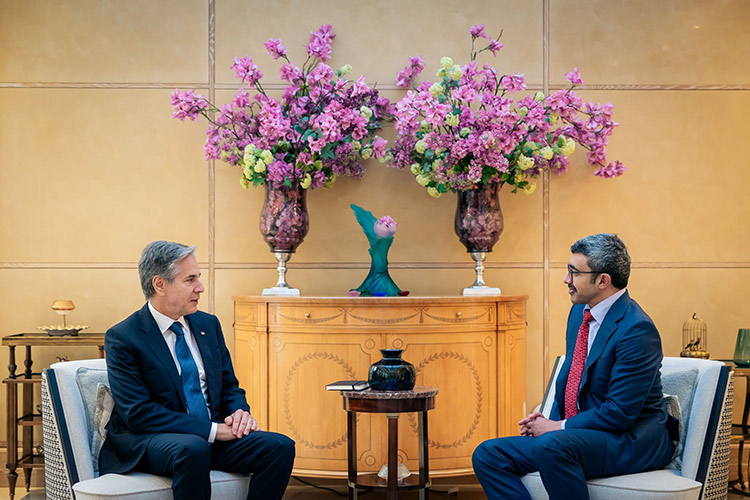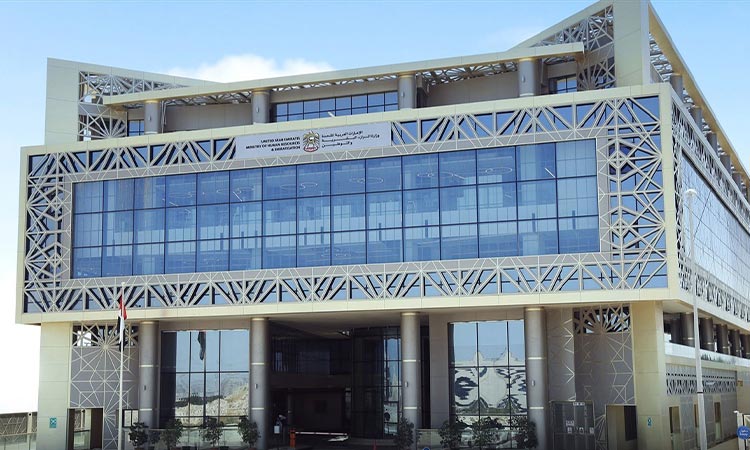Sheikh Mansour approves Dhs6.4 billion in estimated budget for Emiratisation in 2024
- 04 Mar 2024


His Highness Sheikh Mansour Bin Zayed Al Nahyan, Vice President, Deputy Prime Minister, Chairman of the Presidential Court, chaired the first meeting of the Board of Directors of the Emirati Talent Competitiveness Council (ETCC) in 2024. The meeting was attended by H.H. Sheikh Abdullah Bin Zayed Al Nahyan, Minister of Foreign Affairs and Vice Chair of the ETCC Board of Directors.
The Board of Directors approved AED6.4 billion in an estimated budget for the Nafis programme for 2024. The meeting also approved the 2024 Emiratisation targets for the private sector, aligning with UAE leadership directives and the Council's strategy. This key objective aims for 36,000 Emirati citizens to join the private sector workforce this year.
The Board of Directors reviewed the most important achievements of the Council and the Nafis programme during 2023 with the aim of enhancing the participation of citizens in the private sector. The number of citizens in the private sector reached approximately 92,000 by the end of 2023, with the number of citizens who joined the private sector since the launch of Nafis and remained employed until the end of 2023 exceeded 62,000.
The Board of Directors commended the collaborative efforts of all parties concerned and private sector companies, leading to a significant increase of 41,800 citizens joining the private sector in 2023.The total amount paid to the beneficiaries of the Nafis programme until the end of December reached AED4.2 billion. There was also a noticeable increase in the number of partnerships, agreements and memorandums of understanding signed with strategic partners, which reached more than 51 agreements with government, semi-government and private entities in all economic sectors, including aviation, education, training, health, investment, industry and others.
The Board further assessed the Nafis programme's financial and economic impact, noting the qualitative shift it has engendered in perceptions of Emirati private sector employment.
The meeting marked the launch of the national platform and a presentation by the Cyber Security Council on the first phase results of the Nafis project. This platform will serve as a national information and data hub, enabling access for relevant government agencies. This, in turn, will strengthen the integrated system for digital participation and collaboration between federal, local authorities, and the private sector, empowering them to contribute effectively to policy and strategy development.
The Council also seeks, through the platform, to enhance the efficiency and effectiveness of all initiatives and programmes of the Emirates Talent Competitiveness Council.
Sheikh Mansour commended the efforts of the Council during the previous period and its achievements, in addition to the qualitative initiatives it's implementing to support and empower national cadres to work in the private sector. He praised the strong collaboration between the Emirates Talent Competitiveness Council (ETCC) and its government and private sector partners, which has demonstrably contributed to Emiratisation efforts in the country. Sheikh Mansour emphasised the need to redouble efforts in creating more and better employment opportunities for citizens within the private sector.
Ghanam Al Mazrouei, Secretary-General of the Council, praised the support the Council receives from Sheikh Mansour Bin Zayed Al Nahyan and Sheikh Abdullah Bin Zayed Al Nahyan. He stressed that the Council seeks to implement the directives of the wise leadership by qualifying, training and employing citizens in the private sector.
He expressed board's satisfaction with the achieved results, emphasising their commitment to further achievements that meet the leadership's aspirations by working in close collaboration with strategic partners
The platform's launch was emphasized by Dr. Mohamed Al Kuwaiti as a crucial step towards bolstering UAE cybersecurity. He said the platform serves as a central hub for data and resources, leveraging cutting-edge AI and data science technologies to facilitate rapid information exchange among relevant government agencies. Additionally, it supports informed decision-making and key indicator prediction by ensuring data quality and accuracy, he added.
The platform, he explained, adheres to information security standards and policies aligned with Federal Decree-Law No. 45 of 2021 on Protection of Personal Data, ensuring secure data storage and linkage.
Al Kuwaiti added, "We believe that cooperation between all parties concerned is the key to ensuring a decent life for citizens in the private sector in the country." He called on all federal and local government agencies to benefit from the unified national digital platform and contribute to promoting the development drive across the nation.
The Council notably implemented several initiatives over the past year to support the Nafis program, aiming to shift mindsets and raise public awareness of the value of Emirati participation in diverse private sector roles. In a further effort to promote the Nafis programme, the Council launched the second phase of the Nafis Award to recognise outstanding individuals and establishments. The awards ceremony is scheduled for the second quarter of 2024. To strengthen engagement with the target audience, the Council established the Nafis Youth Council. Furthermore, the Council launched the second phase of the ‘'NAFIS... Your way Campaign', highlighting over 200 success stories of individuals, companies, and the community.
In implementation of the Cabinet's decision to form a supply and demand committee in the health sector, 2023 saw the approval of His Highness the Chairman of the Council to form the Emiratisation Committee in the health sector headed by the Minister of Health and Prevention, and the membership of representatives of a number of relevant authorities in the country.
The committee oversees aligning supply and demand for human resources across the public and private health sectors in the country. It also manages and implements the sector's Emiratization roadmap, aiming to achieve the established targets within the time-frame set by the Education and Human Resources Council. This is in addition to approving the details of the projects and initiatives included in the Emiratisation roadmap for the health sector, including the scope, outputs, indicators and success factors.
In the field of strengthening Nafis programmes and initiatives, the 2023 saw the launch of a number of qualitative programs and initiatives, including the Nafis Leaders Programme for private sector workers in cooperation with the Ministry of Cabinet Affairs. The Council also supported, in cooperation with the Ministries of Education and Human Resources and Emiratisation, the experimental programme for vocational training for students in the private sector as part of the Council's efforts to participate in changing concepts.
Within the same framework, the past year witnessed the signing of memorandums of understanding with a number of stakeholders in the country, with the aim of enabling the Council to achieve its goals and implement its initiatives.
In a collaborative effort with the Ministry of Industry and Advanced Technology, the Council launched the "Manufacturer" program to equip Emirati talent with the skills needed to thrive in the industry and advanced technology sector. The "Manufacturer" program is a targeted training initiative for 500 Emirati professionals. It aims to bridge the skills gap between the workforce and industry needs by equipping participants with the technical and specialised expertise sought by manufacturers.
In addition, a teacher training programme was launched in cooperation with the Ministry of Human Resources and Emiratisation and the Ministry of Education.The programme aims to cultivate a skilled workforce for the education sector by providing training, specialized job-seeking programs, and accredited professional licensing. This comprehensive approach empowers individuals to contribute to the private education sector and strengthen the nation's education system, a top national priority. The programme targets 1,000 citizens annually starting from 2024 and up to 4,000 citizens by 2027, to work in the private education sector.
In addition, a memorandum of understanding was signed with the Ministry of Culture to launch a programme building a new generation of talented national competencies in the creative industries sector, according to which companies that work with the Ministry of Culture register on the NAFIS platform, including employment companies in the creative industries sector and provide annual training and employment opportunities for citizens in private companies operating in the field of cultural and creative industries.
This cooperation aims to employ 500 citizens and women annually from those registered on the NAFIS platform within the cultural and creative industries sector over three years, to empower talented national cadres and enhance their integration in the private sector.
The Chairman of the Council also approved in 2023 the ‘Nafis International Programme’, an initiative designed to train select Emirati citizens at esteemed global companies and international organisations. The programme is slated for launch this year.
WAM








